
Hannah Cabell and Anna Chlumsky in David Adjmi’s 3C at Rattlestick Theatre (Photo: Joan Marcus)
After nearly three years during which playwright David Adjmi was prevented from authorizing any productions of, or the publication of, his play 3C, a dark parody of Three’s Company, he has emerged as the victor in his legal battle with DLT Entertainment, which sought to silence the play, charging copyright infringement. Adjmi’s assertion of fair use was confirmed in the judgment.
Quoting from the ruling by Judge Loretta A. Preska, Chief United States District Court Judge in the Southern District of New York:
“Adjmi wishes to authorize publication of 3C and licensing of the play for further production and therefore brings this action seeking a declaration that 3C does not infringe DLT’s copyright in Three’s Company. Adjmi’s motion is GRANTED…”
The 56-page ruling goes on to summarize the play in detail, and then moves to discussion of the ruling, including:
“There is no question that 3C copies the plot premise, characters, sets and certain scenes from Three’s Company. But it is well recognized that “[p]arody needs to mimic an original to make its point, and so has some claim to use the creation of its victim’s. . .imagination.” Campbell, 510 U.S. at 581. The “purpose and character” analysis assumes that the alleged parody will take from the original; the pertinent inquiry is how the alleged parody uses that original material.
“Despite the many similarities between the two, 3C is clearly a transformative use of Three’s Company. 3C conjures up Three’s Company by way of familiar character elements, settings, and plot themes, and uses them to turn Three’s Company’s sunny 1970s Santa Monica into an upside-down, dark version of itself. DLT may not like that transformation, but it is transformation nonetheless.”
In conclusion, the judge wrote:
“The play is a highly transformative parody of the television series that, although it appropriates a substantial amount of Three’s Company, is a drastic departure from the original that poses little risk to the market for the original. The most important consideration under the Section 107 analysis is the distinct nature of the works, which is patently obvious from the Court’s viewing of Three’s Company and review of the 3C screenplay-materials properly within the scope of information considered by the Court in deciding this motion on the pleadings. Equating the two to each other as a thematic or stylistic matter is untenable; 3C is a fair use “sheep,” not an “infringing goat.” See Campbell, 510 U.S. at 586.
“This finding under the statutory factors is confirmed and bolstered by taking into account aims of copyright, as the Court has done throughout.”
Congratulations to Adjmi, to his attorney Bruce E.H. Johnson of Davis Wright Tremaine, to the Dramatists Guild and the Dramatists Legal Defense Fund for their amicus curiae brief in support of Adjmi, and everyone who participated in this fight for authors’ rights and creative freedom.
So, now my question is, what company will be the first to produce 3C now that they’re allowed to at long last, and when can I come and see it?
Howard Sherman is director of the Arts Integrity Initiative at the New School for Drama.

Hannah Cabell and Anna Chlumsky in David Adjmi’s 3C at Rattlestick Playwrights Theater (Photo: Joan Marcus)
Seen any good productions of David Adjmi’s play 3C lately?
Sorry, that’s a trick question with a self-evident answer: of course you haven’t. That’s because in the two and a half years since it premiered at New York’s Rattlestick Playwrights Theater, no one has seen a production of 3C because no one is allowed to produce it, or publish it. Why, you ask? Because a company called DLT Entertainment doesn’t want you to.
3C is an alternate universe look at the 1970s sitcom Three’s Company, one of the prime examples of “jiggle television” from that era, which ran for years based off of the premise that in order to share an apartment with two unmarried women, an unmarried man had to pretend he was gay, to meet with the approval of the landlord. It was a huge hit in its day, and while it was the focus of criticism for its sexual liberality (and constant double entendres), it was viewed as lightweight entertainment with little on its mind but farce and sex (within network constraints), sex that never seemed to actually happen.
Looking at it with today’s eyes, it is a retrograde embarrassment, saved only, perhaps, by the charm and comedy chops of the late John Ritter. The constant jokes about Ritter’s sexual façade, the sexless marriage of the leering landlord and his wife, the macho posturings of the swinging single men, the airheadedness of the women – all have little place in our (hopefully) more enlightened society and the series has pretty much faded from view, save for the occasional resurrection in the wee hours of Nick at Night.
In 3C, Adjmi used the hopelessly out of date sitcom as the template for a despairing look at what life in Apartment 3C might have been had Ritter’s character actually been gay, had the landlord been genuinely predatory and so on. It did what many good parodies do: take a known work and turn it on its ear, making comment not simply on the work itself, but the period and attitudes in which it was first seen.
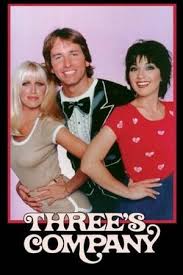 Enter DLT, which holds the rights to Three’s Company. They sent a cease and desist letter to Adjmi back in 2012 claiming that the show violated their copyright; Adjmi said he couldn’t afford to fight it. Numerous well-known playwrights wrote a letter in support of Adjmi and the controversy generated its first wave of press, including pieces in The New York Times and Wall Street Journal. Over time, there have been assorted legal filings by both parties, with another wave of press appearing last year just about this time, when Adjmi sued for the right to reclaim his play for production, with commensurate press coverage once again from the Times and Studio 360, among others.
Enter DLT, which holds the rights to Three’s Company. They sent a cease and desist letter to Adjmi back in 2012 claiming that the show violated their copyright; Adjmi said he couldn’t afford to fight it. Numerous well-known playwrights wrote a letter in support of Adjmi and the controversy generated its first wave of press, including pieces in The New York Times and Wall Street Journal. Over time, there have been assorted legal filings by both parties, with another wave of press appearing last year just about this time, when Adjmi sued for the right to reclaim his play for production, with commensurate press coverage once again from the Times and Studio 360, among others.
Why do I dredge this all up now? Because the bottom line is that DLT is doing its level best to prevent a playwright from earning a living, and throwing everything they can into a specious argument to do so. They say, both in public comments and in their filings, that 3C might confuse audiences and reduce or eliminate the market for their own stage version (citing one they commissioned and one for which they granted permission to James Franco). They cite negative reviews of 3C as damaging to their property. And so on.
But while I’m no lawyer (though I’ve read all of the pertinent briefs on the subject), I can make perfect sense out of the following language from the U.S. Copyright Office, regarding Fair Use exception to copyright (boldface added for emphasis):
The 1961 Report of the Register of Copyrights on the General Revision of the U.S. Copyright Law cites examples of activities that courts have regarded as fair use: “quotation of excerpts in a review or criticism for purposes of illustration or comment; quotation of short passages in a scholarly or technical work, for illustration or clarification of the author’s observations; use in a parody of some of the content of the work parodied; summary of an address or article, with brief quotations, in a news report; reproduction by a library of a portion of a work to replace part of a damaged copy; reproduction by a teacher or student of a small part of a work to illustrate a lesson; reproduction of a work in legislative or judicial proceedings or reports; incidental and fortuitous reproduction, in a newsreel or broadcast, of a work located in the scene of an event being reported.”
As someone who has gone out on a limb at times defending copyright and author’s rights, I’d be the first person to cry foul if I thought DLT had the slightest case here. But 3C (which I’ve read, as it’s part of the legal filings on the case) is so obviously a parody that DLT’s actions seem to be preposterously obstructionist, designed not to protect their property from confusion, but to shield it from the inevitable criticisms that any straightforward presentation of the material would now surely generate.
Rather than just blather on about the motivations of DLT in preventing Adjmi from having his play produced and published, let me demonstrate that their argument is specious. To do so, I offer the following exhibit from Mad Magazine:
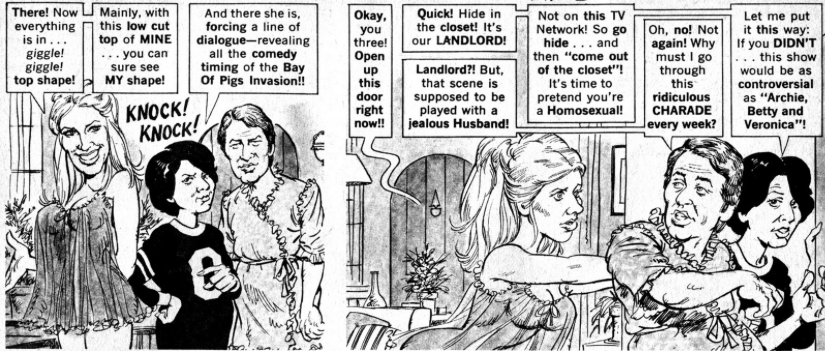
What’s fascinating here is that Mad, a formative influence for countless youths in the 60s and 70s especially, parodied Three’s Company while it was still on the air, seemed to already be aware of the show’s obviously puerile humor, was read in those days by millions of kids – and wasn’t sued for doing so. That was and is a major feature of Mad, deflating everything that comes around in pop culture through parody. The fact is, Adjmi’s script is far more pointed and insightful than any episode of Three’s Company and may well work without deep knowledge of the original show, just like the Mad version.
 The most recent filing in the Adjmi-DLT situation comes from the Dramatists Legal Defense Fund, an offshoot of The Dramatists Guild. Like all of the filings in this case, it’s very informative about copyright in general and parody in particular, and it spells out the numerous precedents where the use of a prior work was permitted under fair use, with particular attention to the idea that when the new work is transformative – which 3C surely is – it is permitted (read the complete amicus curiae brief here). In addition to their many examples, I would add from my own misspent youth such works as Bored of the Rings, a 1969 book-length parody of Tolkien by some of the people who would go on to create the National Lampoon, where incidentally, DLDF president John Weidman exercised his own comic skills) and Airplane!, which took its plotline (and punctuation mark) of a poisoned airline crew directly, uncredited, from the 1957 film Zero Hour! More recently, the endlessly touring Potted Potter has successfully run without authorization, though clearly derived from the works of J.K. Rowling and prior to any authorized stage interpretation.
The most recent filing in the Adjmi-DLT situation comes from the Dramatists Legal Defense Fund, an offshoot of The Dramatists Guild. Like all of the filings in this case, it’s very informative about copyright in general and parody in particular, and it spells out the numerous precedents where the use of a prior work was permitted under fair use, with particular attention to the idea that when the new work is transformative – which 3C surely is – it is permitted (read the complete amicus curiae brief here). In addition to their many examples, I would add from my own misspent youth such works as Bored of the Rings, a 1969 book-length parody of Tolkien by some of the people who would go on to create the National Lampoon, where incidentally, DLDF president John Weidman exercised his own comic skills) and Airplane!, which took its plotline (and punctuation mark) of a poisoned airline crew directly, uncredited, from the 1957 film Zero Hour! More recently, the endlessly touring Potted Potter has successfully run without authorization, though clearly derived from the works of J.K. Rowling and prior to any authorized stage interpretation.
It’s been months since there have been filings for summary judgment in the case (August 2014, to be precise), and according to Bruce Johnson, the attorney at Davis Wright Tremaine in Seattle who is leading the fight on Adjmi’s behalf, there is no precise date by which there will be a ruling. Some might say that I’m essentially rehashing old news here, but I think it’s important that the case remains prominent in people’s minds, because it demonstrates the means by which a corporation is twisting a provision of copyright law to prevent an artist from having his work seen – and that’s censorship with a veneer of respectability conferred by legal filings under the umbrella of commerce. There may be others out there facing this situation, or contemplating work along the same lines, and this case may be suppressing their work or, depending upon the ultimate decision, putting them at risk as well.
We don’t all get to vote on this, unfortunately. But even armchair lawyers like me can see through DLT’s strategy. I just hope that the judge considering this case used to read humor magazines in his youth, which should provide plenty of precedent above and beyond what’s in the filings. 3C may take a comedy and make it bleak, but there’s humor to be found in DLT’s protestations, which are (IMHO) a joke.
P.S. I don’t hold the copyright to any of the images on this page. I’m reproducing them under Fair Use. Just FYI.
Not to dash anyone’s dreams, but I think it’s fair to say that the majority of the hundreds of thousands of students who participate in high school theatre annually will not go on to professional careers in the arts. The same holds true for the student musicians in orchestras, bands and ensembles. They all benefit from the experience in many ways: from the teamwork, the discipline and the appreciation of the challenge and hard work that goes into such endeavors, to name but a few attributes.
But for some students, those high school experiences may be the foundation of a career, of a life, and it’s an excellent place for skills and principles to be taught. As a result, I have, on multiple occasions, heard creative artists talk about their wish that students could learn about the basics of copyright, which can for writers, composers, designers, and others be the root of how they’ll be able to make a life in the creative arts, how their work will reach audiences, how they’ll actually earn a living.
I’m not suggesting that everyone get schooled in the intricacies of copyright law, but that as part of the process of creating and performing shows, students should come to understand that there is a value in the words they speak and the songs they sing, a concept that’s increasingly frayed in an era of file sharing, sampling, streaming and downloading. Creative artists try to make this case publicly from time to time, whether it’s Taylor Swift pulling her music from Spotify over the service’s allegedly substandard rate of compensation to artists or Jason Robert Brown trying to explain why copying and sharing his sheet music is tantamount to theft of his work. But without an appreciation for what copyright protects and supports, it’s difficult for the average young person to understand what this might one day mean to them, or to the people who create work that they love.
* * *
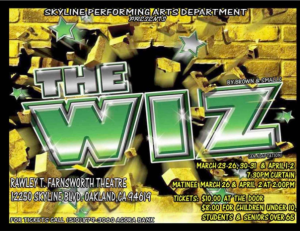 All of this brings me to a seemingly insignificant example, that of a production of the musical The Wiz at Skyline High School in Oakland, California back in 2011. Like countless schools, Skyline mounted a classic musical for their students’ education and enjoyment, in this case playing eight performances in their 900 seat auditorium, charging $10 a head. These facts might be wholly unremarkable, except for one salient point: the school didn’t pay for the rights to perform the show.
All of this brings me to a seemingly insignificant example, that of a production of the musical The Wiz at Skyline High School in Oakland, California back in 2011. Like countless schools, Skyline mounted a classic musical for their students’ education and enjoyment, in this case playing eight performances in their 900 seat auditorium, charging $10 a head. These facts might be wholly unremarkable, except for one salient point: the school didn’t pay for the rights to perform the show.
The licensing house Samuel French only learned this year about the production, and consequently went about the process of collecting their standard royalty. Over the course of a few months, French staff corresponded with school staff and volunteers connected with the drama program, administration and ultimately the school system’s attorney. French’s executive director Bruce Lazarus shared the complete correspondence with me, given my interest in authors’ rights and in school theatre.
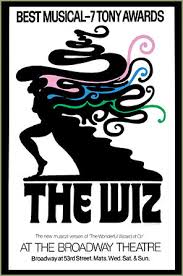 I’m very sympathetic to any school that wants to give their students a great arts experience, and so the drama advisor’s discussion in the correspondence of limited resources and constrained budgets really struck me. Oakland is a large district and Skyline is an inner-city school; I have no reason to doubt their concerns about the quoted royalty costs for The Wiz being beyond their means. But their solution to this quandary took them off course.
I’m very sympathetic to any school that wants to give their students a great arts experience, and so the drama advisor’s discussion in the correspondence of limited resources and constrained budgets really struck me. Oakland is a large district and Skyline is an inner-city school; I have no reason to doubt their concerns about the quoted royalty costs for The Wiz being beyond their means. But their solution to this quandary took them off course.
Skyline claims that they did their own “adaptation” of The Wiz, securing music online and assembling their own text, under the belief that this released them from any responsibility to the authors and the licensing house. While they tagged their ads for the show with the word “adaptation,” it’s a footnote, and if one looks at available photos or videos from the production, it seems pretty clear that their Wiz is firmly rooted in the original material, even the original Broadway production. Surely the text was a corruption of the original and perhaps songs were reordered or even eliminated. It’s also worth noting that Skyline initially inquired about the rights, but then opted to do the show without an agreement.
* * *
OK, so one school made a mistake over three and a half years ago – what’s the big deal? That brings me to the position taken by the Oakland Unified School District regarding French’s pursuit of appropriate royalties. OUSD has completely denied that French has any legitimate claim per their attorney, Michael L. Smith. In a mid-October letter, Mr. Smith cites copyright law statute of limitations, saying that since it has been more than three years since the alleged copyright violation, French is “time barred from any legal proceeding.” Explication of that position constitutes the majority of the letter, save for a phrase in which Mr. Smith states, “As you are likely aware, there are limitations on exclusive rights that may apply in this instance, including fair use.”
As I’m no attorney, I can’t research or debate the fine points of statutes of limitation, either under federal or California law. However, I’ve read enough to understand that there’s some disagreement within the courts, as to when the three-year clock begins on a copyright violation. It may be from the date of the alleged infringement itself, in this case the date of the March and April 2011 performances, but it also may be from the date the infringement is discovered, which according to French was in September 2014. We’ll see how that plays out.
The passing allusion to fair use provisions is perhaps of greater interest in this case. Fair use provides for the utilization of copyrighted work under certain circumstances in certain ways. Per the U.S. Copyright office:
Copyright Law cites examples of activities that courts have regarded as fair use: “quotation of excerpts in a review or criticism for purposes of illustration or comment; quotation of short passages in a scholarly or technical work, for illustration or clarification of the author’s observations; use in a parody of some of the content of the work parodied; summary of an address or article, with brief quotations, in a news report; reproduction by a library of a portion of a work to replace part of a damaged copy; reproduction by a teacher or student of a small part of a work to illustrate a lesson; reproduction of a work in legislative or judicial proceedings or reports; incidental and fortuitous reproduction, in a newsreel or broadcast, of a work located in the scene of an event being reported.”
* * *
Rather than parsing the claims and counterclaims between Samuel French and the school district, I consulted an attorney about fair use, though in the abstract, not with the specifics of the show or school involved. I turned to M. Graham Coleman, a partner at the firm of Davis Wright Tremaine in their New York office. Coleman works in all legal aspects of live theatre production and counsels clients on all aspects of copyright and creative law. He has also represented me on some small matters.
“In our internet society, “ said Coleman, “there is a distortion of fair use. We live in a world where it’s so easy to use someone’s proprietary material. The fact that you based work on something else doesn’t get you off the hook with the original owner.”
Without knowing the specifics of Skyline’s The Wiz, Coleman said, “They probably edited, they probably varied it, but they probably didn’t move it into fair use. Taking a protectable work and attempting to ‘fair use’ it is not an exercise for the amateur.”
Regarding the language in fair use rules that cite educational purposes, Coleman said, “Regardless of who you are, once you start charging an audience admission, you’re a commercial enterprise. Educational use would be deemed to mean classroom.”
While Coleman noted that the cost of pursuing each and every copyright violation by schools might be cost prohibitive for the rights owners, he said that, “It becomes a matter of principle and cost-effectiveness goes out the window. They will be policed. Avoiding doing it the bona fide way will catch up with you.”
* * *
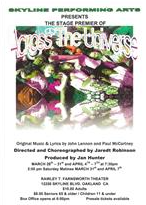 That’s where the Skyline scenario gets more complicated – because their “adaptation” of The Wiz wasn’t their only such appropriation of copyrighted material. In 2012, the school produced a stage version of Julie Taymor’s Beatles-inspired film Across The Universe, billing it accordingly and crediting John Lennon and Paul McCartney as the songwriters. The problem is, there is no authorized stage adaptation of the film, although there have been intermittent reports that Taymor is contemplating her own, which her attorney affirmed to me. In this case, the Skyline production is still within the statute of limitations for a copyright claim.
That’s where the Skyline scenario gets more complicated – because their “adaptation” of The Wiz wasn’t their only such appropriation of copyrighted material. In 2012, the school produced a stage version of Julie Taymor’s Beatles-inspired film Across The Universe, billing it accordingly and crediting John Lennon and Paul McCartney as the songwriters. The problem is, there is no authorized stage adaptation of the film, although there have been intermittent reports that Taymor is contemplating her own, which her attorney affirmed to me. In this case, the Skyline production is still within the statute of limitations for a copyright claim.
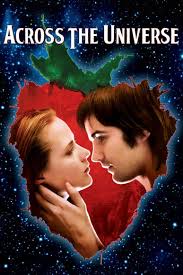 I attempted to contact both the principal of Skyline High and the superintendent of the school district about this subject, ultimately reaching the district’s director of communications Troy Flint. In response to my questions about The Wiz, Flint said, “We believe that we were within our rights. I can’t go into detail because I’m not prepared to discuss our legal strategy. We believe this use was permissible.”
I attempted to contact both the principal of Skyline High and the superintendent of the school district about this subject, ultimately reaching the district’s director of communications Troy Flint. In response to my questions about The Wiz, Flint said, “We believe that we were within our rights. I can’t go into detail because I’m not prepared to discuss our legal strategy. We believe this use was permissible.”
He couldn’t speak to Across The Universe; it seemed that I may have been the first to bring it to the district’s attention. Flint said he didn’t know whether other Skyline productions, such as Hairspray and Dreamgirls, had been done with licenses from rights companies, although I was able to confirm independently that Hairspray was properly licensed. Which raises the question of why standard protocol for licensing productions was followed with some shows and not others.
* * *
My fundamental interest is in seeing vital and successful academic theatre. So while their identities are easily accessible, I’ve avoided naming the teacher, principal and even the superintendent at Skyline because I don’t want to make this one example personal. But I do want to make it an example.
Whether or not I, or anyone, personally agree with the provisions of U.S. copyright law isn’t pertinent to this discussion, and neither is ignorance of the law. The fact is that the people who create work (and their heirs and estates) have the right to control and benefit from that work during the copyright term. Whether the content is found in a published script and score, shared on the internet or transcribed from other media, the laws hold.
If the Skyline examples were the sole violations, a general caution would be unnecessary, but in the past three months alone, Samuel French has discovered 35 unlicensed/unauthorized productions at schools and amateur companies, according to the company’s director of licensing compliance Lori Thimsen. Multiply that out over other rights houses, and over time, and the number is significant. This even happens at the professional level.
At the start, I suggested that students should know the basic of copyright law, both out of respect for those who might make their careers as creative artists, as well as for those who will almost certainly be consumers of copyrighted content throughout their lives. But it occurs to me that these lessons are appropriate for their teachers as well, notwithstanding the current legal stance at Skyline High. There can and should be appreciation for creators’ achievements as well as their rights, and appropriate payment for the use of their work – and those who regularly work with that material should make absolutely certain they know the parameters, to avoid and prevent unwitting, and certainly intentional, violations.
* * *
One final note: some of you may remember Tom Hanks’s Oscar acceptance speech for the film Philadelphia, when he paid tribute to his high school drama teacher for playing a role in his path to success. It might interest you to know that Hanks attended Skyline High and thanks in part to a significant gift from him, the school’s theatre – where the shows in question were performed – was renovated and renamed for that teacher, Rawley Farnsworth, in 2002. Hanks also used the occasion of the Oscars to cite Farnsworth and a high school classmate as examples of gay men who were so instrumental in his personal growth.
I have no doubt that there are other such inspirational teachers and students at Skyline High today, perhaps working in the arts there under constrained budgets and resources. Yet regardless of statutes of limitations, it seems that the Rawley T. Farnsworth Theatre should be a place where respect for and responsibility to artists is taught and practiced, as a fundamental principle – and where students get to perform works as their creators intended, not as knockoffs designed to save money.
* * *
Update, December 3, 2014, 4 pm: This post went live at at approximately 10:30 am EST this morning. I received an e-mail from OUSD’s director of communications Troy Flint at approximately 1 pm asking whether the post was finished and whether he could add to his comments from yesterday. I indicated that the post was live and provided a link, saying that I have updated posts before and would consider an addendum with anything I found to be pertinent. He just called to provide the following statement, which I reproduce in its entirety.
Whatever the legality of the situation at Skyline regarding The Wiz and Across The Universe, the fundamental principle is that we want the students to respect artists’ work and what they put into the product. My understanding is that Skyline’s use of this material is legally defensible, but that’s not the best or highest standard.
As we help our students develop artistically, we want to make sure they have the proper respect and understanding of the work that’s involved with creating a play for the stage or the cinema. So we have spoken with the instructors at Skyline about making sure they follow all the protocols regarding rights and licensing, because we don’t want to be in a position of having the legality of one of our productions questioned as they are now and we don’t want to be perceived as taking advantage of artists unintentionally as we are now. It’s not just a legal issue but an issue of educating students properly.
While everyone I have spoken with about this issue disagrees fairly strenuously with the opinion of the OUSD legal counsel, it’s encouraging that the district wants to stand for artists’ rights and avoid this sort of conflict going forward. I hope they will ultimately teach not only the principle, but the law. As for past practice, I leave that to the lawyers.
Update, December 3, 2014, 7 pm: Following my update with the statement from the school district, I received a statement of response from Bruce Lazarus, executive director of Samuel French. It is excerpted here.
By withholding the proper royalty for The Wiz from the authors, the OUSD is communicating to their students that artistic work is worthless. Is this an appropriate message for any budding artist? That you too can grow up to write a successful musical…only to then have a school district destroy your work and willfully withhold payment?
It needs to be made clear to the OUSD and the students involved that an artist’s livelihood depends on receiving payment for their creative work. This is how artists make a living. How they pay the rent and feed their families. It is simply unbelievable that this issue can be tossed aside with an “Our bad, won’t happen again” response without consideration of payment for their unauthorized taking of another’s property.
Are other students of the OUSD, those that are not artists, being educated to expect payment for their services rendered when they presumably become doctors, engineers, entrepreneurs and the next leaders of the Bay Area? Of course they are. And so it goes for the artists in your classrooms, who should be able to grow up KNOWING there is protection for their future work and a real living wage to be made.
Equal time granted, I leave it the respective parties to resolve the issue of what has already taken place.











